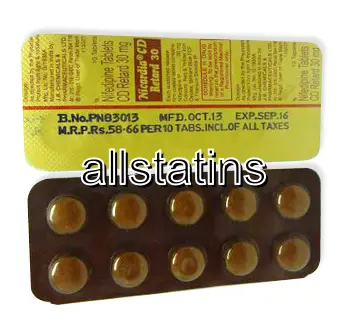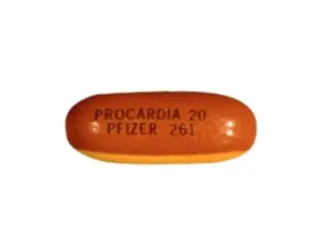| Package | Dosage | Price | Price per Dose | |
|---|---|---|---|---|
| Dosage: 10mg | ||||
| 360 pill | 10mg | $362.37 | $1.00 | |
| 180 pill | 10mg | $197.32 | $1.09 | |
| 120 pill | 10mg | $143.50 | $1.20 | |
| 90 pill | 10mg | $120.18 | $1.33 | |
| 60 pill | 10mg | $91.48 | $1.52 | |
| 30 pill | 10mg | $53.80 | $1.79 | |
| Dosage: 20mg | ||||
| 360 pill | 20mg | $432.34 | $1.20 | |
| 180 pill | 20mg | $238.58 | $1.33 | |
| 120 pill | 20mg | $179.38 | $1.49 | |
| 90 pill | 20mg | $154.27 | $1.70 | |
| 60 pill | 20mg | $116.59 | $1.96 | |
| 30 pill | 20mg | $73.54 | $2.48 | |
| Dosage: 30mg | ||||
| 180 pill | 30mg | $464.63 | $2.58 | |
| 120 pill | 30mg | $335.46 | $2.80 | |
| 90 pill | 30mg | $274.46 | $3.05 | |
| 60 pill | 30mg | $208.09 | $3.46 | |
| 30 pill | 30mg | $121.97 | $4.09 | |
| 10 pill | 30mg | $46.63 | $4.74 | |

Nifedipine Description
Overview of Nifedipine
Nifedipine is a widely used medication primarily prescribed for the treatment of cardiovascular conditions. It belongs to the class of drugs known as calcium channel blockers. These medications work by relaxing the muscles of the heart and blood vessels, which helps to lower blood pressure and improve blood flow. Nifedipine is available in various forms, including immediate-release tablets, sustained-release tablets, and the extended-release form. Its versatility makes it suitable for managing different patient needs and medical conditions.
Therapeutic Uses
This medication is mainly prescribed for the treatment of angina pectoris, a condition characterized by chest pain caused by reduced blood flow to the heart. Nifedipine helps to prevent angina attacks by dilating coronary arteries and improving oxygen supply to the heart muscles. It is also frequently used to control high blood pressure (hypertension). By lowering blood pressure, Nifedipine reduces the risk of strokes, heart attacks, and other cardiovascular complications.
How It Works
Nifedipine functions by blocking calcium channels in the smooth muscle cells of blood vessels. This blockade prevents calcium from entering the cells, resulting in relaxation and dilation of the arteries. As a consequence, the heart faces less resistance when pumping blood, which helps in reducing blood pressure. Its vasodilatory effect not only alleviates angina but also assists in relieving the workload on the heart, making it an effective medication for cardiovascular management.
Advantages and Effectiveness
Many patients report that Nifedipine provides quick relief from anginal symptoms and effectively maintains blood pressure levels. Its rapid action in the case of immediate-release formulations offers prompt symptom management. The extended-release versions support sustained blood pressure control, reducing the need for multiple doses throughout the day. Overall, Nifedipine's proven efficacy and relatively mild side effect profile make it a popular choice among healthcare providers.
Possible Side Effects
As with any medication, Nifedipine can cause side effects. Common reactions include dizziness, flushing, headache, and swelling of the ankles or feet. Some patients might experience a feeling of lightheadedness, especially when standing up quickly. There can also be gastrointestinal discomfort, such as nausea or stomach upset. Rarely, more serious adverse effects like rapid heartbeat, allergic reactions, or worsening angina may occur. It is important for patients to discuss any unusual symptoms with their healthcare provider promptly.
Precautions and Interactions
Patients should inform their doctor about any other medications they are taking, as Nifedipine can interact with several drugs. For instance, combining it with certain other blood pressure medications or heart rhythm drugs may enhance side effects or alter its effectiveness. People with certain medical conditions, such as severe aortic stenosis or unstable angina, should use Nifedipine with caution or avoid it altogether. Regular blood pressure monitoring and medical check-ups are recommended during treatment to ensure optimal safety and effectiveness.
Usage Guidelines
Nifedipine should be taken exactly as prescribed by a healthcare professional. It is usually taken orally, with or without food. Patients are advised not to suddenly stop the medication without consulting their doctor, as this could lead to a sudden increase in blood pressure or worsening symptoms. For sustained-release formulations, it is important to adhere to the prescribed dosing schedule to maintain consistent blood levels of the medication. If a dose is missed, patients should follow their doctor's instructions on how to proceed, rather than doubling doses.

